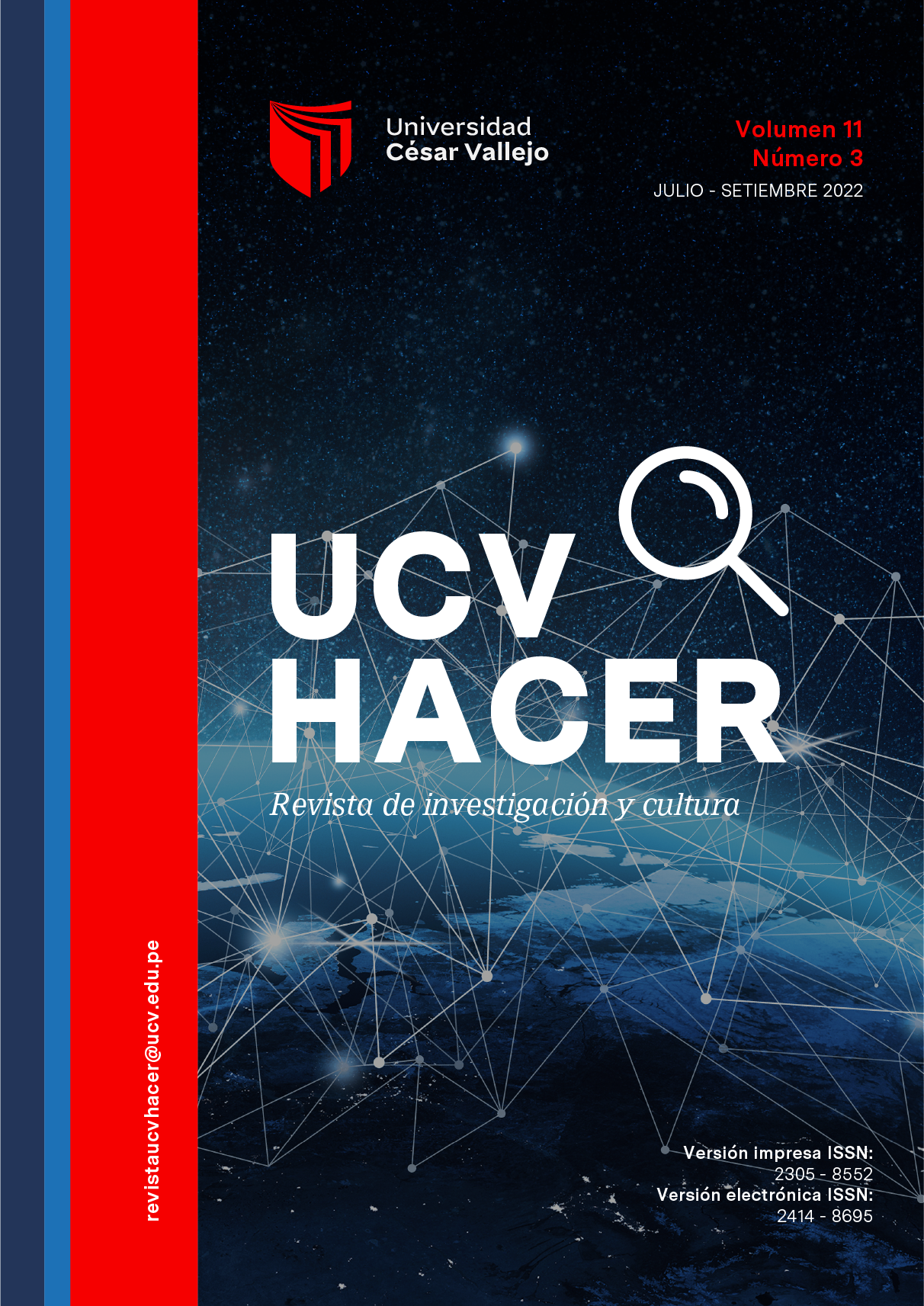Factores condicionantes y efectividad del servicio público de agua potable en el Cantón Santa Lucía, Guayas-Ecuador
DOI:
https://doi.org/10.18050/RevUCVHACER.v11n3a2Palabras clave:
Planificación pública y agua potable, Gestión pública del recurso del agua, Gobernanza comunitaria, StakeholdersResumen
Se determinó la influencia de los factores condicionantes del servicio público de agua potable sobre la efectividad del servicio en el Cantón Santa Lucía, Provincia Guayas-Ecuador, 2022. La estrategia fue cuantitativa, consultándose mediante un cuestionario (α: 0.978) a 150 stakeholders (líderes comunitarios) vinculados a la gestión y disfrute del servicio público de agua potable. La influencia se determinó con la prueba de correlación tipo Rho de Spearman, y la magnitud de la misma fue calculada a partir del tamaño del efecto (SE). Se emplearon los software SPSS V.24 y G*Power 3.1. Se partió del supuesto de que los factores condicionantes del servicio público de agua potable incidían positiva y significativamente en la efectividad del servicio. El análisis confirma que estos factores tienen una incidencia positiva, significativa y alta en la efectividad del servicio en el Cantón Santa Lucía (Rho=0.815, p-valor=0.000; SE > 0.5). El desglose por factores confirmó lo anterior (Rho p-valor= ≤ 0.05; SE > 0.5). Los factores normativos evidenciaron relaciones significativas con todas las dos dimensiones de la efectividad del servicio: cobertura de la demanda y economía del servicio. Se pudo evidenciar también, mediante la Rho de Spearman, que los factores técnicos también influyen sobre todas las dimensiones de la efectividad del servicio público, situación que fue apreciada de igual manera para con los factores económicos. En términos de planificación pública convendría incorporar a los stakeholders en todos los procesos inherentes a la misma. De esta forma se generarían co-responsabilidades y se estimularía la co-gestión.
Palabras clave: Planificación pública y agua potable, gestión pública del recurso del agua, gobernanza comunitaria, stakeholders.
Descargas
Referencias
AAguilar, I. y Monforte, G. (2018). Servicios públicos del agua, valor público y sostenibilidad. El caso del área metropolitana de Monterrey. Gestión y política pública, 27(1), 149-179. https://dialnet.unirioja.es/servlet/articulo?codigo=6297009
Alvarado, J. (2019). Buen Vivir y Políticas públicas en Ecuador: Una revisión del proceso formativo de la Ley Orgánica de Recursos Hídricos. Pro Sciences. Revista de Producción, Ciencias e Investigación, 3(26), 24-30. https://doi.org/10.29018/issn.2588-1000vol3iss26.2019pp24-30
Arredondo, E. y Gómez, R. (2017). La calidad en los servicios públicos desde la perspectiva del consumidor: el caso de la empresa pública municipal de agua potable y alcantarillado de Santo Domingo (EPMAPA-SD). Mikarimin. Revista Científica Multidisciplinaria, 3(2), 13-24. http://45.238.216.13/ojs/index.php/mikarimin/article/view/601
Ley Orgánica del Consejo de Participación Ciudadana y Control Social (2009). Factores condicionantes y efectividad del servicio público de agua potable en el Cantón Santa Lucía, Guayas-Ecuador. https://www.oas.org/juridico/PDFs/mesicic4_ecu_org8.pdf
Ley Orgánica de recursos hídricos, usos y aprovechamiento del agua. Segundo Suplemento del Registro Oficial 305. (2014). https://municipiobanos.gob.ec/banos/images/LEYES/LEY_ORGANICA_DE_RECURSOS_HIDRICOS__USOS_Y_APROVECHAMIENTO_DEL_AGUA.pdf
Barrientos, W., Reyes, V., Puescas, M., Sequera, A. y Rojas, V. (2022). Imaginarios sociales sobre el impacto de la ruta turística binacional Ecuador—Perú. UCV Hacer, 11(1), 95–102.
https://doi.org/10.18050/RevUCVHACER.v11n1a9
Bizerra, I. (2016). Estudio de las prioridades en la satisfacción de los stakeholders en proyectos de colaboración público privada de agua y saneamiento [Tesis doctoral, Universidad Ramón LLul]. Repositorio Institucional de la Universidad Ramón Llul. https://www.tdx.cat/handle/10803/352471#page=1
Bravo, Á. (2017). Hacia un reconocimiento del agua como derecho humano universal. Revista de Direito Econômico e Socioambiental, 8(3), 220-238. https://doi.org/10.7213/.
Caldera, A. Tagle, D., y Escalante, B. (2017). El Derecho Humano al Agua en México. Un análisis desde la perspectiva de gobernanza y los proyectos políticos. O Social em Questão, 19(36), 149-176. http://osocialemquestao.ser.puc-rio.br/media/7_OSQ_36_Ortega_Zamora_Rocha.pdf
Cohen, J. (1992). A power primer. Psychological Bulletin, 112(1), 155-159. https://doi.org/10.1037//0033-2909.112.1.155.
Daher, B., Hannibal, B., Portney, K., y Mohtar, R. (2019). Toward creating an environment of cooperation between water, energy, and food stakeholders in San Antonio. Science of The Total Environment. National Library of Medicine, 651, 2913-2926. https://doi.org/10.1016/j.scitotenv.2018.09.395
Daher, B., Mohtar, R., Pistikopoulos, E. N., Portney, K., Kaiser, R., y Saad, W. (2018). Developing Socio-Techno-Economic-Political (STEP) Solutions for Addressing Resource Nexus Hotspots. Sustainability, 10(2), 512. https://doi.org/10.3390/su10020512
Flores, J. (2019). La provisión descentralizada de servicios públicos en México: El caso del agua potable y su saneamiento [Tesis Doctoral en Políticas Públicas, Centro de Investigación y Docencia Económicas]. Repositorio Digital CIDE. http://repositorio-digital.cide.edu/handle/11651/3988
Garcia, G., Reyes, V., Sequera A., Davelouis, P. y Lugo, J. (2015). Los Proyectos Sociales y la Valoración del Impacto Social [Tesis Doctoral, Universidad Nacional Experimental Simón]. Repositorio Universidad Nacional Experimental Simón.
Gobierno Autónomo Descentralizado Municipal del Cantón Santa Lucía. (2021). Plan de desarrollo y ordenamiento territorial del Cantón Santa Lucía. https://app.sni.gob.ec/sni-link/sni/PORTAL_SNI/data_sigad_plus/sigadplusdocumentofinal/0960002000001_PDyOT%20SANTA%20LUC%c3%8dA%202014_2025_ACTUALIZADO_2016_16-04-2016_11-52-35.pdf
Gobierno Autónomo Descentralizado Municipal del Cantón Santa Lucía (2021). Censo cantonal de recintos. Gobierno Autónomo Descentralizado del Cantón de Santa Lucía.
Hernández, R., Fernández, C., y Baptista, M. (2014). Metodología de la investigación. Editorial Mc Graw-Hill. https://www.icmujeres.gob.mx/wp-content/uploads/2020/05/Sampieri.Met.Inv.pdf
Kassa, K., Chernet, M., Kelemework, M., Zewde, B. y Woldemedhin, A. (2017). Customer satisfaction survey: The case of urban water supply services in Southern Ethiopia. Water Practice & Technology, 2(4), 1009-1017. https://doi.org/10.2166/wpt.2017.105
Koche, J. (2011). Fundamentos de metodología científica. Editora Vozes. http://www.adm.ufrpe.br/sites/ww4.deinfo.ufrpe.br/files/Fundamentos_de_Metodologia_Cienti%CC%81fica.pdf
Mballa, L. y Hernández-Espericueta, F. (2018). Las políticas públicas de abastecimiento de agua potable y saneamiento para la localidad de Escalerillas, San Luis Potosí –México: Escenarios y percepción ciudadana. Agua y territorio = Water and Landscape, 11, 137-152. https://dialnet.unirioja.es/servlet/articulo?codigo=6493234
Navarro-Chaparro, K., Rivera, P., y Sanchez, R. (2016). Análisis del manejo de agua en la ciudad de Tijuana, Baja California: Factores críticos y retos. Estudios fronterizos, 17(33), 53-82. http://www.scielo.org.mx/scielo.php?script=sci_abstract&pid=S0187-69612016000100003&lng=es&nrm=iso&tlng=es
Madureira, D., Barros, L., Martins, A. y Mederios, H. (2020). Economic sustainability of water supply public policy in Brazil semiarid regions. Research, Society and Development, 9(6). https://doi.org/10.33448/rsd-v9i6.3435
Núñez, W. (2018). El derecho fundamental al agua dentro del marco del servicio público de agua potable en el Ecuador [Tesis de Maestría, Universidad Andina Simón Bolívar]. UASB-DIGITAL Repositorio Institucional del Organismo de la Comunidad Andina, CAN. http://repositorio.uasb.edu.ec/handle/10644/6190
Okumah, M. y Yeboah, A. (2020). Exploring stakeholders’ perceptions of the quality and governance of water resources in the Wenchi municipality. Journal of Environmental Planning and Management, 63(8), 1375-1403. https://doi.org/10.1080/09640568.2019.1663724
Pereira, A., Moreira, D., Parreira, F. y Shitsuka, R. (2018). Metodología da pesquisa científica. Editorial Universidad Federal De Santa María. https://www.ufsm.br/app/uploads/sites/358/2019/02/Metodologia-da-Pesquisa-Cientifica_final.pdf
Renner, J. y Opiyo, F. (2021). ’Stakeholders’ interactions in managing water resources conflicts: A case of Lake Naivasha, Kenya. Zeitschrift Für Wirtschaftsgeographie. Journal Zeitschrift für Wirtschaftsgeographie. https://doi.org/10.1515/zfw-2019-0024
Souto, G., Dos, A. y Aguiar, C., (2020). Gestão dos Recursos Hídricos no Município de Parauapebas (PA): Avaliação dos Usos, Alteração dos Cenários e Possíveis Impactos. Research, Society and Development, 9(4), 1-15. http://dx.doi.org/10.33448/rsd-v9i4.3042
Secretaría del Agua de la República del Ecuador (2017). Acuerdo Ministerial 2017-0031. https://www.gob.ec/regulaciones/2017-0031-instructivo-optimizacion-procesos-realiza-organizaciones-comunitarias
Vitorino, D., Almeida, V., Guimarães, J., Silva, A., Moraes, L., y Souza, G. (2019). Gerenciamento e caracterização dos recursos hídricos na comunidade do Barro Preto no município de Santa Maria de Itabira MG. Research, Society and Development, 8(9), e06891249-e06891249. https://doi.org/10.33448/rsd-v8i9.1249
Zebedayo, S. (2020). Assessment of the Effects of Customer Relationship Management in Customer Satisfaction”, A case of Masasi Nachingwea Water Supply and sanitation Authority. Mtwara. [Tesis doctoral, Mzumbe University]. Repositorio digital Mzumbe University http://scholar.mzumbe.ac.tz/handle/11192/
Descargas
Publicado
Versiones
- 2022-07-01 (2)
- 2022-07-01 (1)
Número
Sección
Licencia
Derechos de autor 2022 UCV Hacer

Esta obra está bajo una licencia internacional Creative Commons Atribución-NoComercial-CompartirIgual 4.0.










